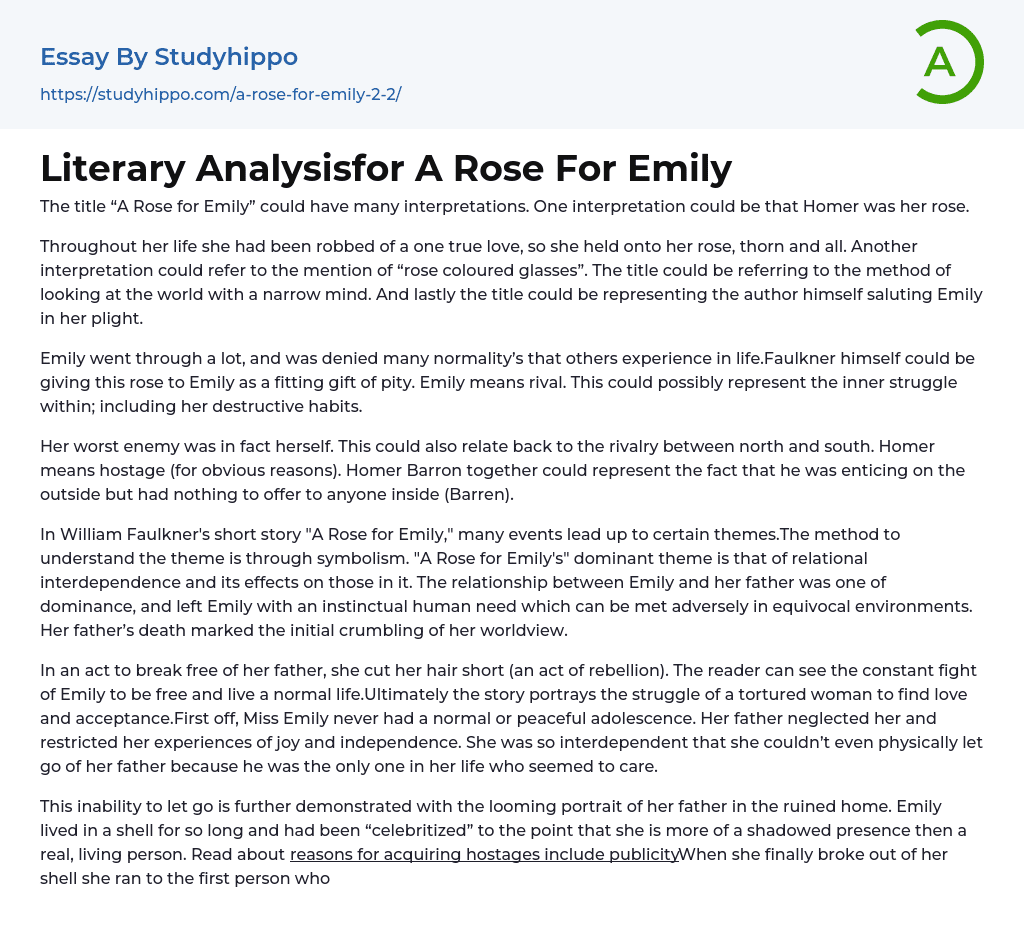There are various ways to interpret the title "A Rose for Emily." One possible interpretation is that Homer served as Emily's rose.
During her lifetime, she never experienced true love and clung onto a rose with its thorn intact. The title may indicate the act of having a narrow-minded perspective referred to as "rose-colored glasses," or it may signify the writer paying tribute to Emily in her struggles.
Emily's life has been challenging and deprived of typical experiences that others encounter. Faulkner may have presented her with a rose as a symbol of compassion, recognizing her inner turmoil and harmful tendencies since her name means "rival."
The rivalry between North and South could be linked to the fact that the protagonist's biggest adversary was actually herself. Homer's name, which means "hostage," is significant in this context. The name Homer Bar
...ron could symbolize his attractive external appearance but lack of inner substance (Barren).
William Faulkner delves into various events in "A Rose for Emily" to highlight its predominant themes, which are decipherable through symbolism. The tale expounds on the theme of relational interdependence and its implications on individuals entangled in it. Emily's bond with her father was synonymous with authority, causing her to develop an inherent human need that could have unfavorable consequences in uncertain surroundings. The demise of her father marked the onset of Emily's crumbling worldview.
Miss Emily's quest for freedom and a normal life is highlighted by her rebellious act of cutting her hair short to break free from her father. Her constant struggle throughout the story portrays the ordeal of a tormented woman in search of love and acceptance. However, Miss Emily's
adolescence was anything but peaceful or normal due to her father's neglect and restrictions on experiencing joy and independence. She relied heavily on him, both emotionally and physically, as he seemed to be the only one who cared about her well-being.
The ruined home with the looming portrait of Emily's father highlights her inability to let go. Despite being perceived as a shadowed presence and "celebritized," she eventually breaks out of her shell and seeks refuge with someone who doesn't judge her. To learn more about reasons for acquiring hostages, such as gaining publicity, please visit this resource.
Throughout her life, the town was a negative influence and constantly criticized Miss Emily. As a result, she sought solace in the arms of a caring man named Homer Barron. It is revealed, however, that he was not willing to buy her love. Miss Emily's social obstacles ultimately led her to take drastic measures towards Homer's life.
In order to retain her love, she opted to end his life, thereby gaining an undying affection that was entirely at her command. Regrettably, Emily was consumed by time more rapidly than even death itself.
- Book Summary essays
- Metaphor essays
- Reader essays
- Rhyme essays
- Literary devices essays
- Villain essays
- Books essays
- Genre essays
- Literary Criticism essays
- Writer essays
- Protagonist essays
- Simile essays
- Poem essays
- Book Report essays
- Book Review essays
- Greek Mythology essays
- Plot essays
- Tragic Hero essays
- Coming of Age essays
- Play essays
- Rhetoric essays
- Rhetorical Question essays
- Translation essays
- Understanding essays
- Reason essays
- Character essays
- Letter essays
- American Literature essays
- Literature Review essays
- Utopia essays
- Poetry Analysis essays
- Dante's Inferno essays
- Between The World and Me essays
- Incidents in The Life of a Slave Girl essays
- Flowers for Algernon essays
- Myth essays
- Everyday Use essays
- Boo Radley essays
- Genesis essays
- Richard iii essays
- Alice in Wonderland essays
- On the road essays
- Ozymandias essays
- The Nightingale essays
- Holden Caulfield essays
- Animal Farm essays
- 1984 essays
- A Hanging essays
- Shooting An Elephant essays
- A Tale Of Two Cities essays




